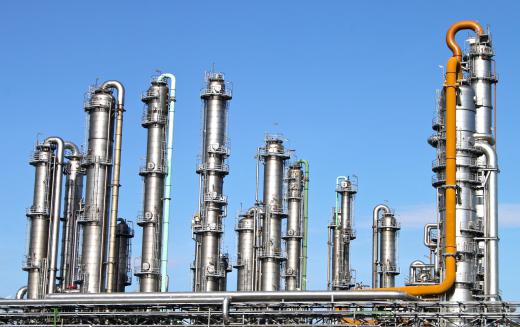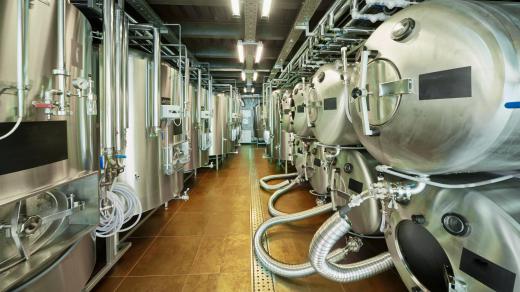Process equipment is equipment used in chemical and materials processing, in facilities like refineries, chemical plants, and wastewater treatment plants. This equipment is usually designed with a specific process or family of processes in mind and can be customized for a particular facility in some cases. Costs vary, depending on whether equipment is being purchased new or used and what it will be utilized for. Companies that manufacture process equipment may also provide support through maintenance and repair contracts to customers interested in these services.
This type of equipment includes things like tanks for chemical reactions, such as fermentation, along with tanks designed for storing materials used in various processes. Filters, controllers, valves, and other auxiliary equipment is also considered a form of process equipment. Specific facilities may have equipment needed for catalyzing various reactions, controlling flow of materials through process piping, and other activities.

Some concerns with the design of process equipment include designing corrosion-resistant material capable of handling the materials being processed, along with developing equipment that is unlikely to leak or fail. Such equipment can include failsafes and alarms intended to act in the event of an emergency. Legal codes may specify building materials and other standards for specific types of processes and equipment must comply with these standards.

New process equipment is sometimes readily available and must be ordered by arrangement in other cases. Companies buying new equipment may have customization options available. These options allow companies to tailor equipment to their facilities to address specific needs and concerns. When developing custom equipment, companies may send consultants to the facility where it will be used to confirm that a design is appropriate and offer advice on configuring the equipment.
Used process equipment can often be purchased when companies close or repurpose factories. When entire companies liquidate, this equipment can sometimes be picked up very cheaply by people willing to attend liquidation auctions and similar events. Used equipment tends to be lower cost, but it may also be more prone to failure because it is older. In addition, it may require retrofitting or customization before it can be installed in a new facility, depending on changes to the building code along with changes in processing standards.
Proper maintenance is critical for process equipment. Most equipment has a regular maintenance schedule people are encouraged to follow to reduce the risk of catastrophic accidents. If equipment begins behaving abnormally, it may need to be shut down for diagnostic testing and repair.
Ever since she began contributing to the site several years ago, Mary has embraced the exciting challenge of being a About Mechanics researcher and writer. Mary has a liberal arts degree from Goddard College and spends her free time reading, cooking, and exploring the great outdoors.

